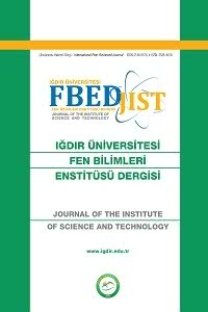M-Estimations of Shape and Scale Parameters by Order Statistics in Least Informative Distributions on q-deformed logarithm
Distribution, efficiency, estimation, order statistics, robustness
M-Estimations of Shape and Scale Parameters by Order Statistics in Least Informative Distributions on q-deformed logarithm
Distribution, Efficiency, Estimation, Order statistics, robustness,
___
- Andrews DF, Hampel FR, 2015. Robust estimates of location: Survey and advances. Princeton University Press.
- Arnold BC, Balakrishnan N, Nagaraja HN, 1992. A first course in order statistics (Vol. 54). Siam.
- Bozdogan H, 1987. Model selection and Akaike's information criterion (AIC): The general theory and its analytical extensions. Psychometrika 52(3):345-370.
- Csaki F, 1981. Second international symposium on information theory. Académiai Kiadó, Budapest.
- Çankaya MN, Korbel J, 2017. On statistical properties of Jizba–Arimitsu hybrid entropy. Physica A: Statistical Mechanics and its Applications 475: 1-10.
- Çankaya MN, Korbel J, 2018. Least informative distributions in maximum q-log-likelihood estimation. Physica A: Statistical Mechanics and its Applications 509: 140-150.
- Çankaya MN, 2018. Asymmetric bimodal exponential power distribution on the real line. Entropy 20(1): 1-23.
- Elze HT, 2004. Introduction: Quantum Theory and Beneath? In Decoherence and Entropy in Complex Systems. Springer. Berlin, Heidelberg, 119-124.
- Ferrari D, Yang Y, 2010. Maximum Lq-likelihood estimation. The Annals of Statistics 38(2): 753-783.
- Giuzio M, Ferrari D, Paterlini S, 2016. Sparse and robust normal and t-portfolios by penalized Lq-likelihood minimization. European Journal of Operational Research 250(1): 251-261.
- Gelfand I, Fomin S, 1963. Calculus of Variations. Prentice-Hall Inc. Englewood Cliffs. NJ.
- Godambe VP, 1960. An optimum property of regular maximum likelihood estimation. The Annals of Mathematical Statistics 31(4):1208-1211.
- Hampel FR, Ronchetti EM, Rousseeuw PJ, Stahel WA, 2011. Robust statistics: the approach based on influence functions. John Wiley & Sons. Vol. 196.
- Huber-Carol, C, Balakrishnan, N, Nikulin M, Mesbah M. (Eds.), 2012. Goodness-of-fit tests and model validity. Springer Science & Business Media.
- Huber PJ, 1981. Ronchetti EM. Robust statistics. John Wiley & Sons. New York.
- Jizba P, 2004. Information theory and generalized statistics. In Decoherence and Entropy in Complex Systems (pp. 362-376). Springer, Berlin, Heidelberg.
- Jizba P, Korbel J, 2016. On q-non-extensive statistics with non-Tsallisian entropy. Physica A: Statistical Mechanics and its Applications 444: 808-827.
- Malik SC, Arora S, 1992. Mathematical analysis. New Age International.
- Ni XS, Huo X, 2009. Another look at Huber's estimator: A new minimax estimator in regression with stochastically bounded noise. Journal of statistical planning and inference 139(2):503-515.
- Örkcü HH, Özsoy VS, Aksoy E, Dogan MI, 2015. Estimating the parameters of 3-p Weibull distribution using particle swarm optimization: A comprehensive experimental comparison. Applied Mathematics and Computation 268: 201-226.
- Proschan F, 1963. Theoretical explanation of observed decreasing failure rate. Technometrics 5(3), 375-383.
- Prudnikov AP, Brychkov, IA, Marichev OI, 1986. Integrals and series: special functions (Vol. 2). CRC Press.
- Rinne, H, 2008. The Weibull distribution: A handbook. CRC press.
- Shevlyakov G, Morgenthaler S, Shurygin A, 2008. Redescending M-estimators. Journal of Statistical Planning and Inference 138(10): 2906-2917.
- Suyari H, 2006. Mathematical structures derived from the q-multinomial coefficient in Tsallis statistics. Physica A: Statistical Mechanics and its Applications 368(1): 63-82.
- Tsallis C, 1988. Possible generalization of Boltzmann-Gibbs statistics. Journal of statistical physics 52(1-2): 479-487.
- ISSN: 2146-0574
- Yayın Aralığı: 4
- Başlangıç: 2011
- Yayıncı: -
Şehir Kaynaklı Sera Gazı Emisyonunun Belirlenmesi: Kocaeli İli Örneği
Sebze Tohumu Dış Ticaret Rekabet Düzeyinin Porter’ın Elmas Modeliyle Analizi: Antalya İli Örneği
Abdülkadir FİLİZ, Cengiz SAYIN
Funda SEMENDEROĞLU, Adnan SEMENDEOĞLU, Ahmet Serdar AYTAÇ
Geri Dönüştürülmüş Beton Agregasının Düşük Plastisiteli Bir Kilin Mekanik Özelliklerine Etkisi
Amfiprotik ve Dipolar Aprotik Çözücülerde 3-(4-Aril) Propiyonik Asit Türevlerinin Asitlik Kuvvetleri
T Kaotik Sisteminin Geri Besleme ile Kontrolü
Selcuk EMİROGLU, Yılmaz UYAROĞLU
Farklı Dozlarda Ekzojen Gonadotropin Uygulamasının Serotonin ve Melatonin Düzeylerine Etkisi
İsmail SARI, Erkan GÜMÜŞ, Esma ÖZMEN, Inayet GUNTURK, Serpil ERŞAN, Gönül Şeyda SEYDEL
İnsan Serum Paraoksonaz-1 (hPON1) Üzerine Bendamustin İnhibisyon Etkisi
Hakan SÖYÜT, Yakup ULUTAŞ, Ekrem KÖKSAL
Spin 1 Spinor Construction with Clifford Algera and Dirac Spin 1/2 Spinors
